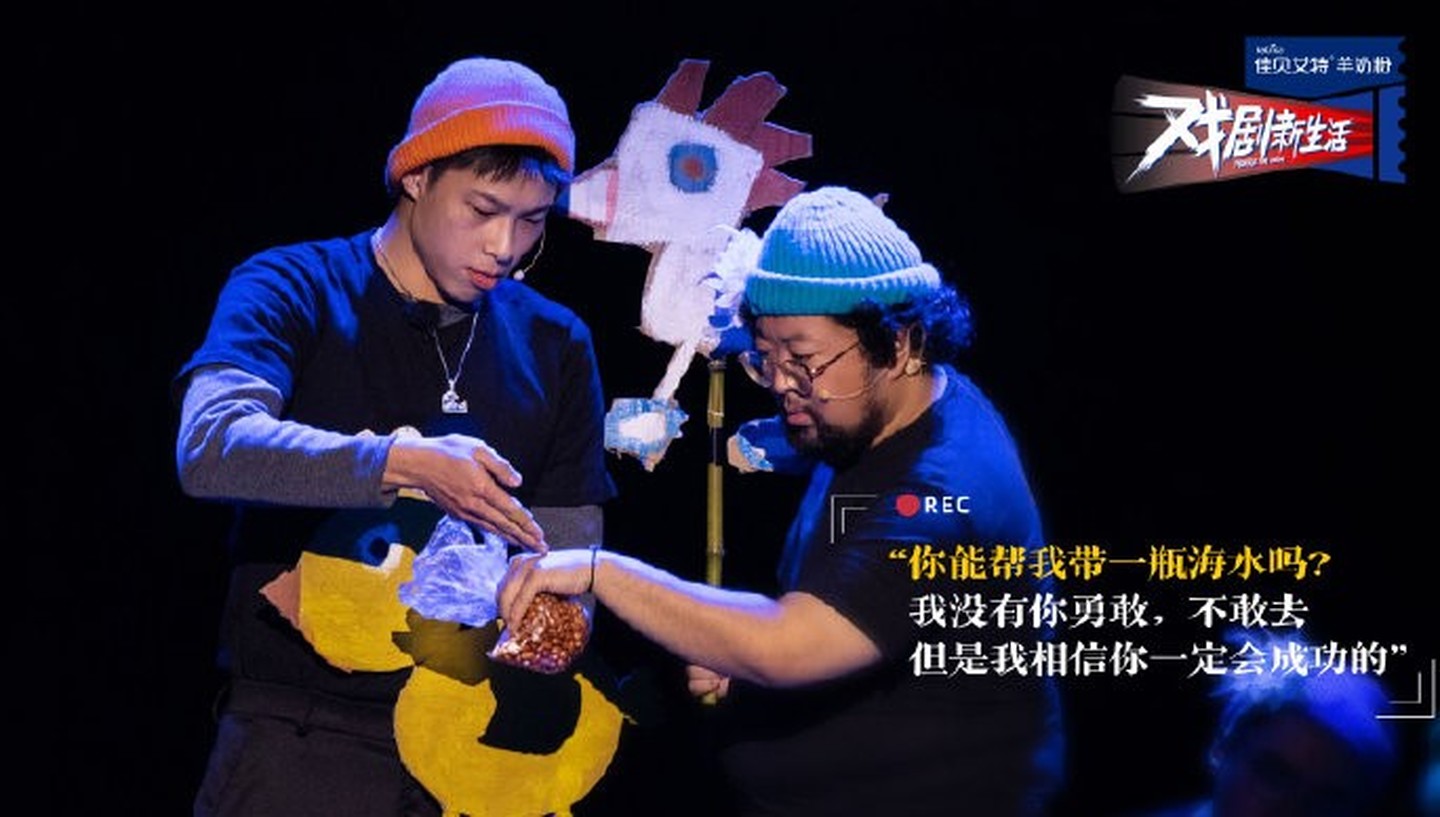Earlier in January, an unusual hashtag trended on Weibo: #戏剧不值一顿饭钱吗? (xì jù bù zhí dé yī dùn fàn qián ma).
This hashtag translates as, “Is theater really not worth the price of a meal?” For weeks after, people online were driven into lengthy conversations about the value of art and theater.
But what caused this debate? A reality TV show.
 Scene from “Theater For Living”; featuring Xiu Rui and Liu Tianqi during a performance
Scene from “Theater For Living”; featuring Xiu Rui and Liu Tianqi during a performance
On January 16, a new Chinese reality show called 戏剧新生活 (xì jù xīn shēng huó), or “Theater For Living” aired online. Although categorized as reality TV, it is much closer to a social experiment with one question in mind.
Is it possible to survive purely through theater?
Eight dramatists were invited to this show. Participants included Wu Bi and Liu TianQi, recipients of China’s most prestigious Wuzhen Drama Festival, and Ding YiTeng, the only Chinese trouper in the world-renowned Odin Teatret.
 Promotional poster for all eight dramatists (from left to right, top to bottom): Liu Xiaoye, Xiu Rui, Wu Bi, Zhao Xiaosu, Liu Xiaoyi, Ding Yiteng, Liu Tianqi, Wu Haochen
Promotional poster for all eight dramatists (from left to right, top to bottom): Liu Xiaoye, Xiu Rui, Wu Bi, Zhao Xiaosu, Liu Xiaoyi, Ding Yiteng, Liu Tianqi, Wu Haochen
Together, they were asked to create and perform a new play each week. The revenue would pay for all expenses—stage related, living or otherwise—in the span of the show.
There was just one catch. No one was buying the tickets.
A Small Following, A Failed Experiment From The Start?
First of all, none of the main cast in “Theater For Living” were “celebrities.”
 Scene from show; Wu Bi in performance
Scene from show; Wu Bi in performance
Although musicals have become popular in China, plays have not. Compared to movies and TV shows that have tens of millions of fans, the Chinese stage has always had few fans.
What this means is that the eight participants are nameless. Although the best in their field, they are no different from a regular passerby to general audiences.
 Scene from show; dramatist creating handmade props for performance
Scene from show; dramatist creating handmade props for performance
To make matters worse, “Theater For Living” had no patrons when it first aired. With no sponsors and no "celebrities," it seemed impossible that the social experiment would succeed.
Is Theater Worth the Price of a Meal?
At one point in the show, participant Wu HaoChen was selling tickets for their newest play. They had spent 10,000 RMB (around $1,600) on renting the theater, but had yet to sell many tickets.
 Member from the crowd asks for a 90% discount; Wu Haochen says "will you come at 90%? We rehearse day and night and spent 10,000RMB (around $1,500) on renting the theater..."
Member from the crowd asks for a 90% discount; Wu Haochen says "will you come at 90%? We rehearse day and night and spent 10,000RMB (around $1,500) on renting the theater..."
Afraid of an empty turnout, Haochen desperately makes a final attempt. This is where the hashtag emerged.
In this video, Haochen tries to sell tickets to a group of three. In the beginning, they agree. But when Haochen says one ticket is 50 RMB (around $8), they hesitate. Disheartened, Haochen asks,
“Miss, we’ve spent days practicing for this play. Is it not even worth the price of a meal?”
 Scene from show depicting their initial living conditions
Scene from show depicting their initial living conditions
To the vast majority of Chinese people, 50 RMB (around $8) is a very small sum. It’s the price of two bubble teas, or a hearty meal.
But to the three standing there at that time, it was not worth the performance of the play.
For many, this was a saddening exchange. But the value of art has always subjective.
To an unappreciative eye, a painting may not be worth a coffee, much less the intangible experience of theater.
But to those who love theater, it is priceless.
From Unknown to The Best Show of The Year
 Scene from show: Zhao Xiaosu in performance, saying "although my sins are bloody, I must wash them clean"
Scene from show: Zhao Xiaosu in performance, saying "although my sins are bloody, I must wash them clean"
Despite all odds, “Theater for Living” quickly became popular in mainland China because of how it shed light on the struggles of modern artists.
Its quality and heartfelt take on China’s modern stage overrode their lack of celebrities and sponsors, making it an unexpected competitor for best reality show of the year.
Now done airing, the rating for this show has soared to 9.3. And its sponsors have increased dramatically.
The change is so apparent that in the last episode, we find crowds of people lining up to buy a ticket.
 Promotional poster for the last performance of the season, "About the 23rd Planet"
Promotional poster for the last performance of the season, "About the 23rd Planet"
It seems that everyone has fallen in love with these quirky actors that are living, quite literally, for theater. And it also seems that this show has become the first step in a long path to shining a spotlight on modern Chinese theater.



0 Comments